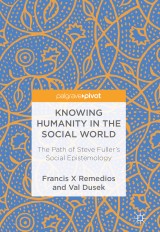Details

Knowing Humanity in the Social World
The Path of Steve Fuller's Social Epistemology|
53,49 € |
|
| Verlag: | Palgrave Macmillan |
| Format: | |
| Veröffentl.: | 09.01.2018 |
| ISBN/EAN: | 9781137374905 |
| Sprache: | englisch |
Dieses eBook enthält ein Wasserzeichen.
Beschreibungen
This book examines Fuller’s pioneering vision of social epistemology. It focuses specifically on his work post-2000, which is founded in the changing conception of humanity and project into a ‘post-‘ or ‘trans-‘ human future. Chapters treat especially Fuller’s provocative response to the changing boundary conditions of the knower due to anticipated changes in humanity coming from the nanosciences, neuroscience, synthetic biology and computer technology and end on an interview with Fuller himself. <div><br/></div><div>While Fuller’s turn in this direction has invited at least as much criticism as his earlier work, to him the result is an extended sense of the knower, or ‘humanity 2.0’, which Fuller himself identifies with transhumanism. The authors assess Fuller’s work on the following issues: Science and Technology Studies (STS), the university and intellectual life, neo-liberal political economy, intelligent design, Cosmism, Gnosticism, agent-oriented epistemology, proactionary vs precautionary principles and Welfare State 2.0.</div>
Chapter 1. Agent-Oriented Social Epistemology.- Chapter 2. Fuller's Relation to STS.- Chapter 3. University and Interdisciplinarity.- Chapter 4. Fuller’s Intelligent Design.- Chapter 5. Fuller’s Cosmism and Gnosticism.- Chapter 6. Proactionary vs. Precautionary Principles.- Chapter 7. Conclusion.- Chapter 8. Postscript – Interview with Steve Fuller.<div><br/></div>
Val Dusek is author of <i>The Holistic Inspirations of Science, Philosophy of Technology: An Introduction</i> and co-edited with Robert Scharff <i>Philosophy of Technology, The Technological Condition</i>. Dusek has previously written on C. S. Peirce, Marxism, the Science Wars, sociobiology and evolutionary psychology.<div><br/></div><div>Francis X Remedios is author of <i>Legitimizing Scientific Knowledge: Steve Fuller’s Social Epistemology</i> and numerous articles on Steve Fuller and social epistemology.</div><div><br/></div>
This book examines Steve Fuller’s pioneering vision of social epistemology. It focuses specifically on his work post-2000, which is founded in the changing conception of humanity and project into a ‘post-‘ or ‘trans-‘ human future. Chapters treat especially Fuller’s provocative response to the changing boundary limitations of the knower due to anticipated changes in humanity coming from the nanosciences, neuroscience, synthetic biology and computer technology and end on an interview with Fuller himself. While Fuller’s turn in this direction has invited at least as much criticism as his earlier work, to him the result is an extended sense of the knower, or ‘humanity 2.0’, which Fuller himself identifies with transhumanism. The authors assess Fuller’s work on the following issues: Science and Technology Studies (STS), agent-oriented social epistemology, the university and intellectual life, neo-liberal political economy, intelligent design, Cosmism, Gnosticism, proactionary vs precautionary principles and Welfare State 2.0.
Explores the impact scientific knowledge has on humanity Examines Steve Fuller's work in social epistemology Discusses how the nanosciences, synthetic biology and computer technology is changing humanity to humanity 2.0
Explores the impact scientific knowledge has on humanity<div><br/></div><div>Examines Steve Fuller's work in social epistemology</div><div><br/></div><div>Discusses how the nanosciences, synthetic biology and computer technology is changing humanity to humanity 2.0</div><div> </div>
“Steve Fuller's "Social Epistemology" has morphed into a contemporary concern with the future of the knowing agent (indeed, of mankind) as exemplified in contemporary transhumanism -- or what Fuller calls Humanity 2.0. The nature of this shift constituted a puzzle for many scholars during the last decade. Remedios' and Dusek's book carefully and accurately address the conceptual process, ideological context and very character of this shift. It is therefore a required text for grasping both the complex nature of Fuller's work and the reasons behind his subsequent philosophical 'turn'.” (Alcibiades Malapi-Nelson, PhD, Humber College and Seneca College, Toronto)<p></p>

















